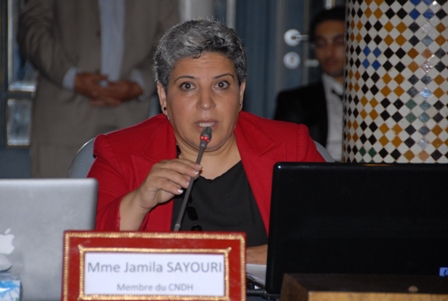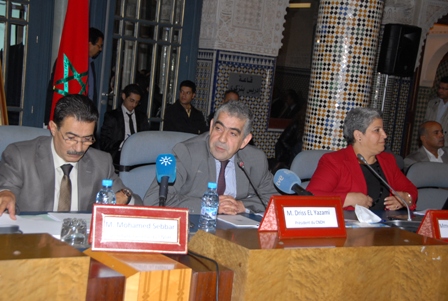PRISON CRISIS: SHARED RESPONSIBILITY TO PROTECT PRISONERS’ RIGHTS, PRESERVE THEIR DIGNITY AND PROMOTE SITUATION IN PRISONS
The National Human Rights Council (CNDH) published its thematic report on the situation of prison and prisoners, entitled “Prison Crisis: A Shared Responsibility - 100 recommendations for the protection of prisoners’ rights. The report was presented during a press conference held by the Council, for this purpose, on October 31, 2012 in its headquarters in Rabat.
The National Human Rights Council (CNDH) published its thematic report on the situation of prison and prisoners, entitled “Prison Crisis: A Shared Responsibility - 100 recommendations for the protection of prisoners’ rights. The report was presented during a press conference held by the Council, for this purpose, on October 31, 2012 in its headquarters in Rabat.
Ms Jamila Sayouri, CNDH member and Rapporteur of the Council’s Working Group on the monitoring of human rights violations and protection of human rights, which was entrusted with the report, outlined the report, its methodology, conclusions and recommendations.
Prison crisis
This report is the second thematic report published by the Council, after its report on mental health and human rights, within the framework of the Council’s mandate under its founding law, mainly article 11 related to the power to visit places of deprivation of liberty. The report is an overview of the crisis of prisons in Morocco; ill treatment, overcrowding, discrimination based on sex and color, non-application of the law and related procedures and measures, legislative issues, are among the highlighted violations in the report.
The report underlined the persistence of abuses against inmates beaten and cruelly, inhumanly or degradingly treated. It indicates that there are still places for torture in some prisons and underlined the excessive use of discretion in interpreting the actions of detainees, not to mention the abusive use of administrative transfer as a disciplinary measure and the inefficient supervision and inspection to eliminate corruption prevailing in some facilities with varying degrees. The excessive recourse to pretrial detention, which is the direct cause of the overcrowding phenomenon, has a negative impact on the service quality in prisons and is considered, itself, as the major cause of grave violations and jeopardizes the fundamental human rights of prisoners, the report days.

The report sheds light on the ordeal of vulnerable groups like women, the elderly, persons with disabilities, foreigners and addicts who undergo additional sufferings, more humiliation and degrading treatment because of stigma, discrimination on the basis of sex or color, absence of legal, treatment and integrating approach guarantees, lack of accessibility…
The report unveils other issues and problems that contribute to the prison crisis such as the non-enforcement of the provisions of the Moroccan penal procedure related to rules and guarantees linked to juvenile justice (mainly articles 458 and 504), absence of clear criteria for nomination to benefit from pardon, release under conditions or other special licenses, and non-application of these criteria on prisoners who served two-third of their prison terms, people with chronic diseases and the elderly, etc.
Among the aspects of the crisis as well, the report talks about the absence of gender approach in the penal legislation, absence of alternative sanctions, especially for misdemeanors punishable by a maximum sentence of five years, loopholes in laws and regulations related to prison, ambiguity in terms of who should be held responsible for the implementation of some measures, limited scope of activities which civil society associations can organize, which are confined only to some special events and need to be approved by the General Delegate of Prison Administration and Reintegration.
Shared responsibility
CNDH officials (President Driss El Yazami and Secretary General Mohammed Essabbar) stressed that the crisis of prisons is a shared responsibility and urges coordination among different stakeholders.
Indeed, the recommendations are addressed to The General Delegation of Prison Administration and Reintegration but also to the Ministry of Justice and Liberties, the Ministry of Interior, the Parliament, in addition to other recommendations related to civil society associations, Mohammed VI Foundation for the reintegration of inmates, the High Commission of the Reform of the Judiciary, the judiciary, the government and the National Human Rights Council itself (mainly for the organization of human rights training sessions for prison officials and staff).
100 recommendations for the protection of prisoners’ rights

Prisoners are citizens who are deprived from their liberty. They are sentenced to a prison term but they should still enjoy their fundamental human rights and be treated respectfully due to their inherent dignity and value as human beings, according to the Basic Principles for the Treatment of Prisoners, adopted by the United General Assembly in December 1990. The National Human Rights Council made thus 100 recommendations, addressed to the relevant stakeholders concerned with the situation in prisons, for the protection of prisoners’ rights.
Among the recommendations of the Council there are, mainly:
- applying the human rights approach on the treatment of prisoners and fight discrimination against them and the use of violence or any form of inhuman, cruel or degrading treatment against them;
- providing sufficient human resources in light of the international standards and building their capacities in the area of human rights training and education;
- ensuring accessibility for people with disabilities;
- carrying out the needed repairs and renovations in old prisons and seeding-up the closure of some prisons (mainly Ain-Kadous local prison in Fez);
- rationalizing pretrial detention and implementing the mechanisms of judicial control and make it mandatory;
- reducing short-term imprisonment and replacing it with conditional sentence or fine payment, until effective alternatives are adopted;
- accelerating the judgment process in cases of pretrial detainees and setting-up mechanisms for conditional release and pardon for prisoners to reduce overcrowding, which is one of the major problems facing penal institutions and the cause of many serious violations that affect many aspects like service-delivery, healthcare, hygiene, nutrition, security and rehabilitation;
- applying the principle of non-recourse to the imprisonment of children, unless for exceptions, as a last resort and for the shortest period possible, training judges specialized in juvenile issues and the need to respect the standards and principles of juvenile justice;
- Since the General Delegation of Prisons and the Ministry of Justice and Liberties are not the bodies concerned by the crisis of prisons, the National Human Rights Council considered other stakeholders. Among the recommendations made in this respect:
- applying legislative control by the parliament in terms of legislations, inquiry, investigation and accountability;
- activating control of provincial committees to improve prison conditions;
- expanding of areas on which civil society organizations can work and strengthening their role to include monitoring of prison conditions, organization of trainings on human rights, gender equality, etc. for prison staff and prisoners;
- strengthening and supporting the role of the Mohammed VI Foundation in the area of subsequent care for released prisoners;
- creating care centers for children born within prison institutions and who may live in difficult situations either because there are no relatives who would take care of them or because their relatives deny them; physical, moral, psychological and social care should be provided in these centers;
- amending, entirely, the low governing prisons and prison administration and harmonizing its provisions with the international human rights standards, , mainly those related to the treatment of prisoners and the duties of law enforcement officers, in compliance with the new mandate of the Parliament;
- launching a broad national dialogue on prison conditions, bringing together all governmental and non-governmental organizations concerned with prison conditions;
- implementing the recommendations of the Equity and Reconciliation Commission to ratify the Second Optional Protocol to the International Covenant on Civil and Political Rights relating to the abolition of the death penalty;
- creating the independent national mechanism for the prevention of torture, provided for in the OPCAT, after launching a broad public debate on its creation.
Answering the questions of journalists who attended the press conference, Mr. Driss El Yazami, CNDH President, explained that the violations highlighted in the report were grave violations, even though they were individual and unsystematic. He said the crisis is structural and the responsibility is shared, which requires collective action and coordination of efforts.
Mr. Mohamed Essabbar, on his turn, considered that this is indeed a real crisis. He explained that the Council did not select 15 prisons to visit, but on the basis of several predefined criteria. He stressed the need to reconsider the punitive policy, the failure of which is clearly demonstrated by the high recidivism rate. Such policy should be based on three pillars: deterrence, rehabilitation and reintegration.
On the basis of a participatory approach, the National Human Rights Council visited 15 prisons, from 31 January to June 19, 2012. Techniques used for prison visits at the international level were observed. The Council adopted a human rights-based approach that took into account the different relevant international conventions and national laws and regulations related to prisoners and prison conditions.
 The report sheds light on the ordeal of vulnerable groups like women, the elderly, persons with disabilities, foreigners and addicts who undergo additional sufferings, more humiliation and degrading treatment because of stigma, discrimination on the basis of sex or color, absence of legal, treatment and integrating approach guarantees, lack of accessibility…
The report sheds light on the ordeal of vulnerable groups like women, the elderly, persons with disabilities, foreigners and addicts who undergo additional sufferings, more humiliation and degrading treatment because of stigma, discrimination on the basis of sex or color, absence of legal, treatment and integrating approach guarantees, lack of accessibility… Prisoners are citizens who are deprived from their liberty. They are sentenced to a prison term but they should still enjoy their fundamental human rights and be treated respectfully due to their inherent dignity and value as human beings, according to the Basic Principles for the Treatment of Prisoners, adopted by the United General Assembly in December 1990. The National Human Rights Council made thus 100 recommendations, addressed to the relevant stakeholders concerned with the situation in prisons, for the protection of prisoners’ rights.
Prisoners are citizens who are deprived from their liberty. They are sentenced to a prison term but they should still enjoy their fundamental human rights and be treated respectfully due to their inherent dignity and value as human beings, according to the Basic Principles for the Treatment of Prisoners, adopted by the United General Assembly in December 1990. The National Human Rights Council made thus 100 recommendations, addressed to the relevant stakeholders concerned with the situation in prisons, for the protection of prisoners’ rights.





















